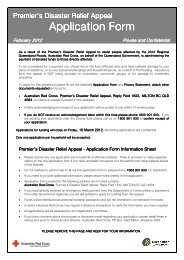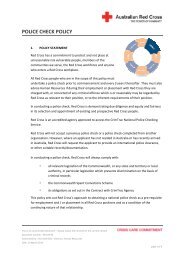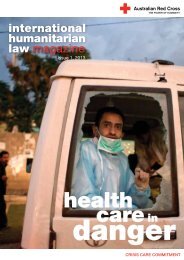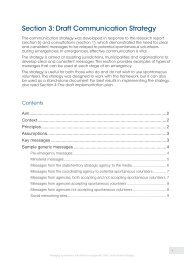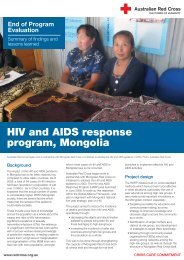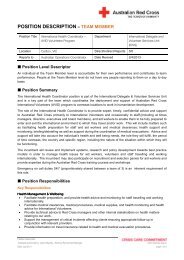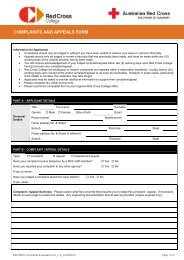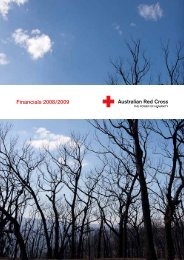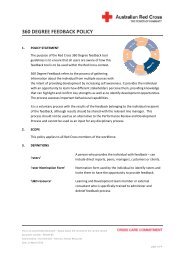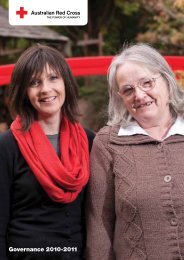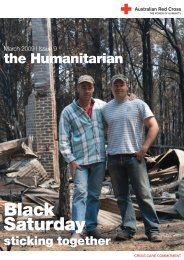Australian Red Cross Delegates Program
Australian Red Cross Delegates Program
Australian Red Cross Delegates Program
- No tags were found...
You also want an ePaper? Increase the reach of your titles
YUMPU automatically turns print PDFs into web optimized ePapers that Google loves.
14<strong>Delegates</strong> <strong>Program</strong> Annual Report 2011-2012> CASE STUDYRemoving red tapefrom relief effortsDisaster strikes, donors rush in, chaos ensues… <strong>Australian</strong> <strong>Red</strong> <strong>Cross</strong>delegate TESSA KELLY is working with governments in the Asia-Pacificregion to ensure that disaster laws will be in place to support and guideinternational actors.Flooding in Manila, landslides in Papua New Guinea, earthquakes in Indonesia… naturaldisasters have become commonplace in the Asia-Pacific region, wreaking havoc onvulnerable communities. International donors often rush to provide assistance, but not allcountries have the laws or systems in place to readily accept this support.This provides ample challenges for <strong>Australian</strong> <strong>Red</strong> <strong>Cross</strong> delegate Tessa Kelly, whocoordinates the International Federation of <strong>Red</strong> <strong>Cross</strong> and <strong>Red</strong> Crescent Societies(IFRC) Disaster Law <strong>Program</strong> for the Asia Pacific. This program plays a critical rolein assisting governments to develop good laws and legal frameworks that can helpto reduce human suffering during times of disaster.Bureaucratic red tape related to entry visas, personnel registration, customsclearance, taxation and transport permissions can all significantly delay relief efforts.As Tessa explains, the proliferation of international responders can furthercomplicate matters for countries that are not prepared for outside assistance.“After the 2004 tsunami, around 200 non government organisations turned up to helpout…While it’s fantastic that so many actors want to get involved in providing assistance,unfortunately what we see is that the amount and variety of helpers can completelyoverwhelm the affected country if they’re not adequately prepared,” Tessa says.To address these issues, the IFRC promotes the use of guidelines for the domesticfacilitation and regulation of international disaster relief and initial recoveryassistance, also known as the International Disaster Response Law (IDRL)guidelines, which were adopted by all components of the <strong>Red</strong> <strong>Cross</strong> and <strong>Red</strong>Crescent Movement and the 194 states party to the Geneva Conventions in 2007.Tessa and her colleagues provide technical assistance to governments in the AsiaPacific region, developing training and tools on IDRL and engaging in advocacy toraise awareness about the need for comprehensive disaster legislation. A particularlysignificant breakthrough has been made in Indonesia, where the government hasincorporated the IDRL guidelines into its legal framework for disaster managementas the result of a six-year program of assistance and advocacy from the IFRC andPalang Merah Indonesia (PMI), the Indonesian <strong>Red</strong> <strong>Cross</strong>.IFRC and PMI began engaging with the Indonesian government in 2005 whenexamining the legal issues encountered in the wake of the Indian Ocean tsunami.“The IFRC and PMI raised awareness of the importance of comprehensively addressingthe facilitation and regulation of international assistance within the legal framework, andprovided advice and support to the government on how best to do this,” Tessa says.In 2007 the government created a new law on disaster management and establisheda National Disaster Management Agency (BNPB) tasked with coordinating riskreduction, strengthening response and leading emergency operations.In 2008, following advocacy from IFRC and PMI the government adopted a regulationaddressing international assistance to support the country’s new disaster law.





